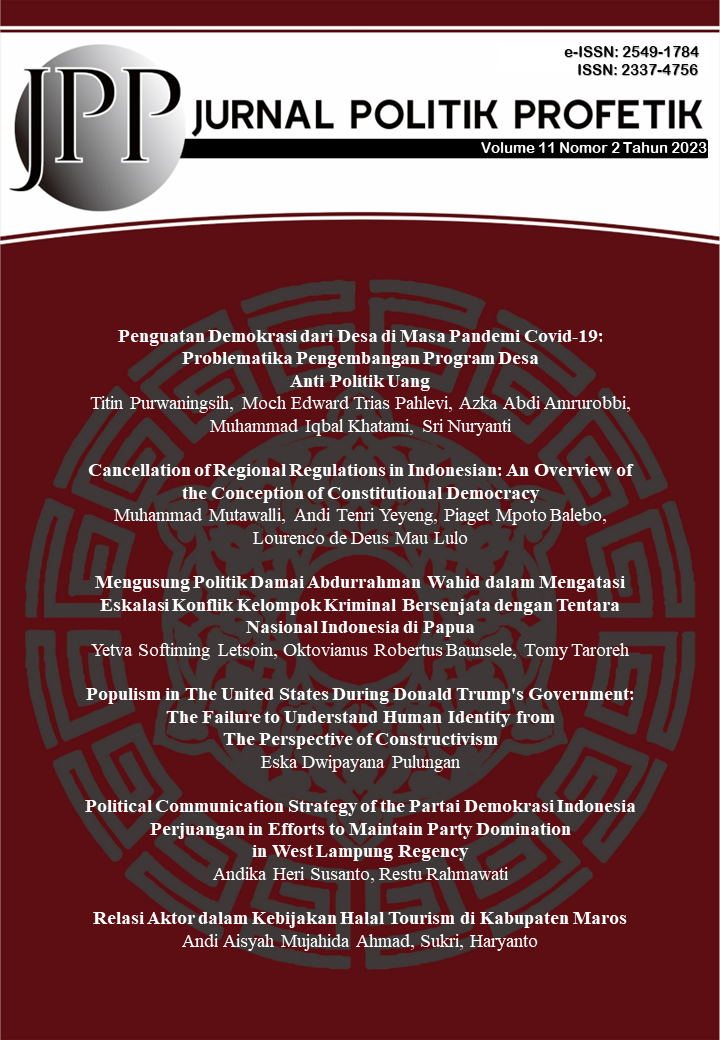Relasi Aktor dalam Kebijakan Halal Tourism di Kabupaten Maros
Abstrak
This article aims to describe the relationship between actors to find the political aspects of halal tourism policies that are a trend in local government policies in Indonesia today. This article uses the Advocacy Coalition Framework (ACF) approach to analyze the position of each policy actor in the formulation of policies on halal tourism in the Maros Regency. The research method uses descriptive qualitative analysis by describing the relationship of policy actors both formally and informally in the formulation of the Draft Regional Regulation on Halal Tourism in the Maros Regency and seeing the interactions that influence the policy process. The results showed that the actors involved in halal tourism policy were divided into two groups: state actors and non-state actors. These policy actors interact with each other, involving different interests. However, the tendency that occurs leads to dependence on state actors. The interaction of these actors results in a coalition of pros and cons, which could weaken the implementation of halal tourism policies. This article contributes to expanding insights in the study of interactions between policy actors involving different interests in halal tourism policy in Indonesia.
##plugins.generic.usageStats.downloads##
Referensi
Battour, M., & Ismail, M. N. (2016). Halal tourism: Concepts, practises, challenges and future. Tourism Management Perspectives, 19, 150–154. https://doi.org/10.1016/J.TMP.2015.12.008
Destiana, R., Kismartini, K., & Yuningsih, T. (2020). Analisis Peran Stakeholders Dalam Pengembangan Destinasi Pariwisata Halal Di Pulau Penyengat Provinsi Kepulauan Riau. Jurnal Ilmu Administrasi Negara ASIAN (Asosiasi Ilmuwan Administrasi Negara), 8(2), 132–153. https://doi.org/10.47828/JIANAASIAN.V8I2.18
Dunn, W. N. (2003). Pengantar Analisis Kebijakan Publik. Gadjah Mada University Press.
GMTI. (2023). Global Muslim Travel Index (GMTI) 2023. Global Muslim Travel Index. https://www.crescentrating.com/reports/global-muslim-travel-index-2023.html
Gunawan, I. (2013). Metode Penelitian Kualitatif: Teori dan Praktik. Bumi Aksara.
Hadi, A., Ali, M., & Zitri, I. (2022). Pola Koalisi Partai Politik dalam Pembahasan Perda Nomor 2 Tahun 2016 Tentang Pariwisata Halal Provinsi Nusa Tenggara Barat. Jurnal Ilmiah Mandala Education, 8(1), 2656–5862. https://doi.org/10.58258/JIME.V8I1.2840
Jenkins-Smith, H. C., & Sabatier, P. A. (1994). Evaluating the Advocacy Coalition Framework. Journal of Public Policy, 14(2), 175–203.
Kusnandar, V. B. (2021, November 3). RISSC: Populasi Muslim Indonesia Terbesar di Dunia. Katadata. https://databoks.katadata.co.id/datapublish/2021/11/03/rissc-populasi-muslim-indonesia-terbesar-di-dunia
Matamaros.com. (2022). Kemenparekraf Dorong Wisata Halal, Bagaimana Konsepnya? Matamaros.Com. https://www.matamaros.com/2022/04/26/kemenparekraf-dorong-wisata-halal-di-maros-bagaimana-konsepnya/
Miles, M., & Huberman, M. (1992). Analisis Data Kualitatif. Universitas Indonesia.
Noversa, F. (2021). Formulasi Peraturan Daerah Provinsi Sumatera Barat Nomor 1 Tahun 2020 Tentang Penyelenggaraan Pariwisata Halal. Universitas Andalas.
Syamsi, A. B., & Adiyono, A. (2020). Urgensi Pembentukan Peraturan Desa Tentang Pengelolaan Wisata Syariah Dalam Meningkatkan Kemandirian Ekonomi Kabupaten Sumenep. KABILAH: Journal of Social Community, 5(2), 58–69. https://doi.org/10.35127/KBL.V5I2.4147
##submission.copyrightStatement##
##submission.license.cc.by-nc-sa4.footer##














